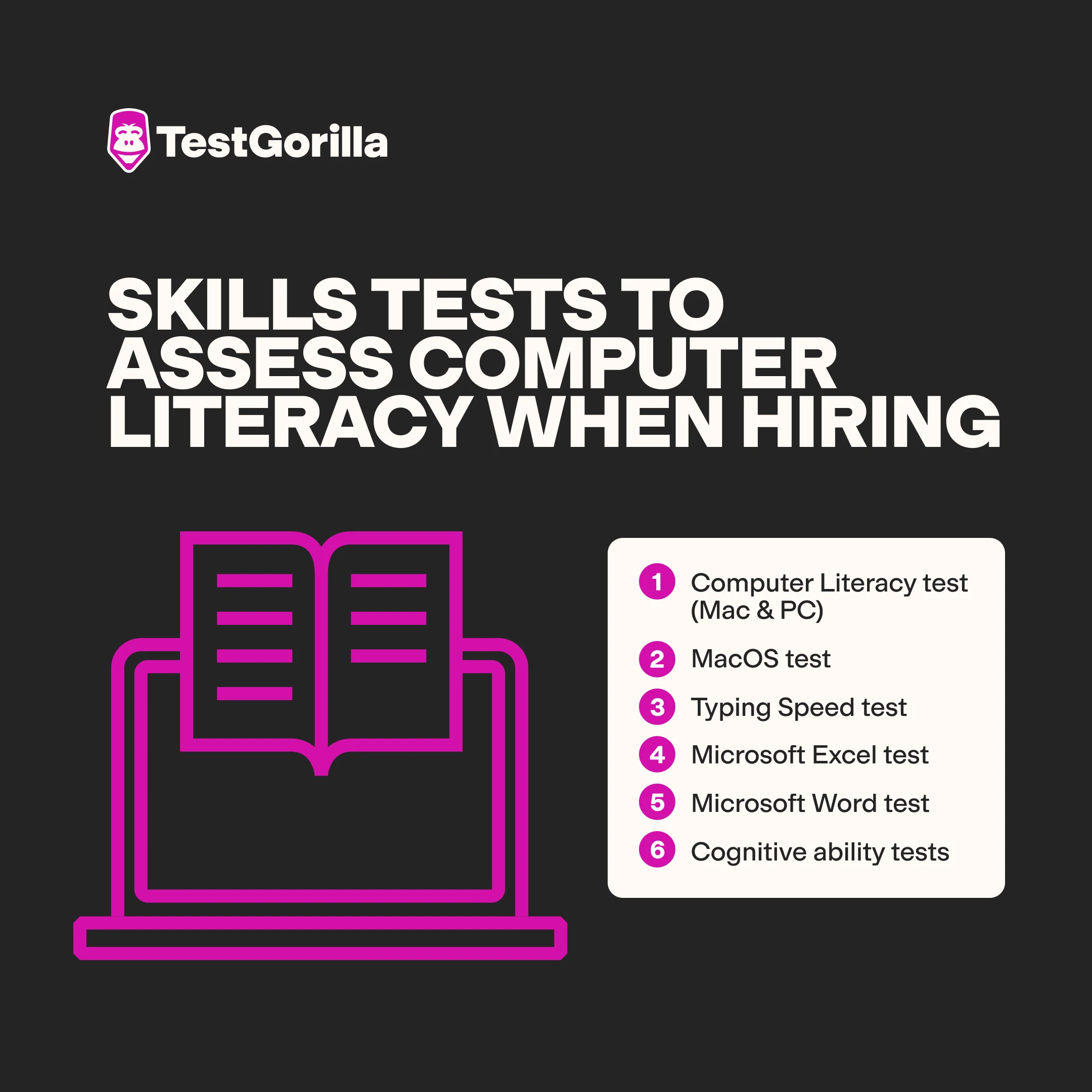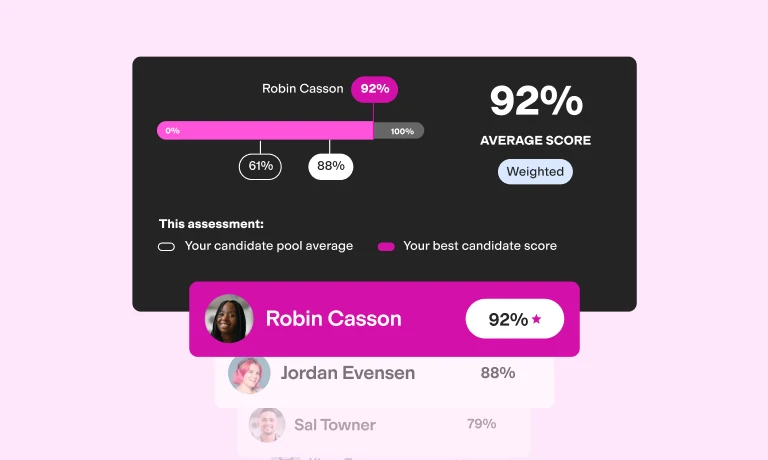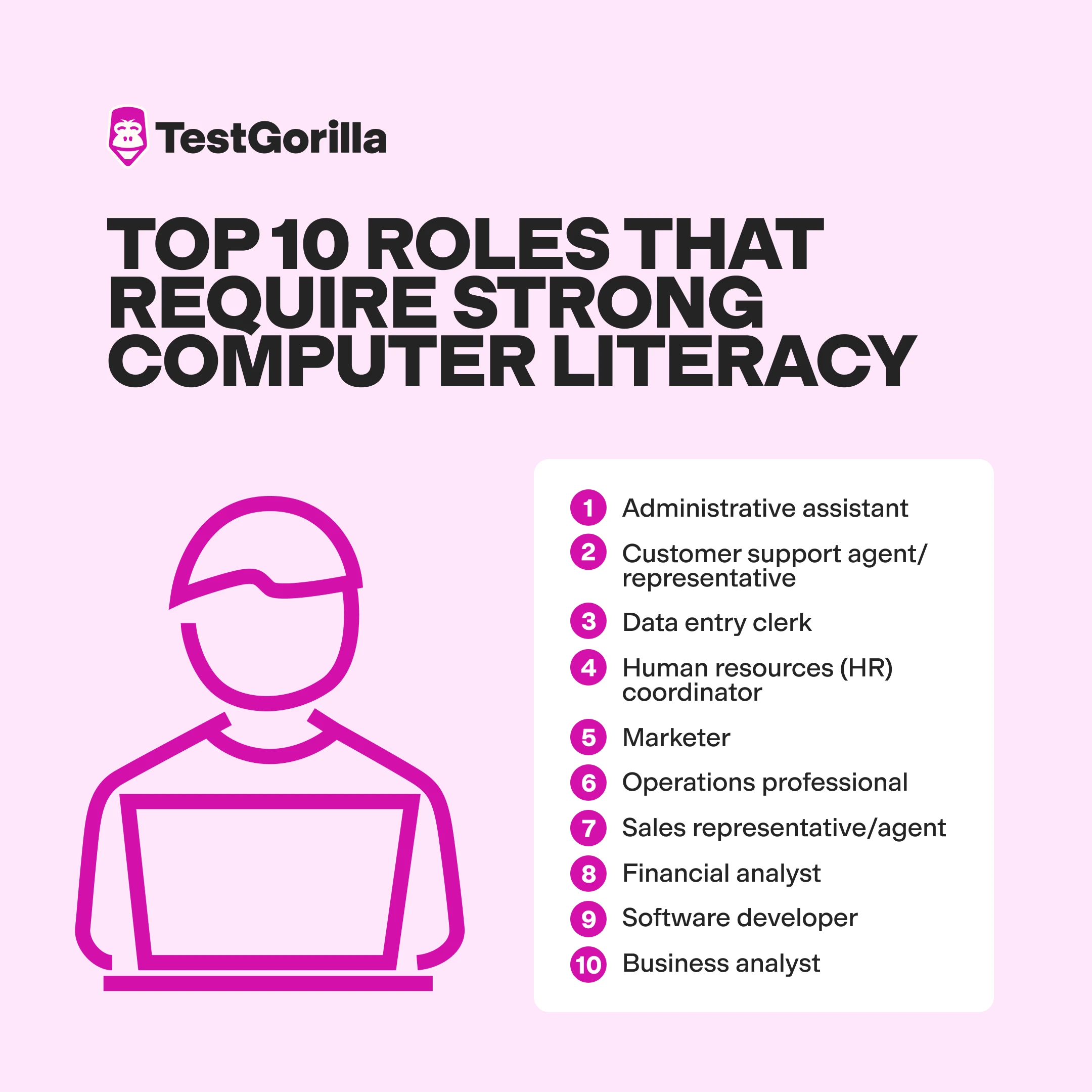More than 90% of today’s jobs require basic digital skills, but many hiring teams are still unclear about how to properly hire for roles that require computer literacy.
They rely solely on resumes, interviews, or even gut feelings to find new hires… when they should be measuring candidates’ real-world skills. In other words, they’re assuming computer literacy instead of assessing it.
To help you avoid the same mistake, we’ve compiled this expert guide. You’ll learn what computer literacy actually means, how to use skills assessments (like TestGorilla’s PC computer literacy and Mac computer literacy tests), and the top roles that require digital skills.
What computer literacy actually means today
Computer literacy used to mean typing skills and knowing how to send an email. Today, it involves a lot more, including:
Typing quickly and accurately
Working across operating systems (such as Windows, macOS, and Linux)
Switching between web, desktop, and mobile interfaces
Understanding basic troubleshooting, like diagnosing connectivity issues, restarting systems, or reinstalling software
Using search engines efficiently – understanding keywords and operators, how to filter results, and evaluating the credibility of sources
Creating, editing, and sharing documents using digital tools like Google Docs or Microsoft Word
Using instant messaging and collaboration platforms (such as Microsoft Teams and Slack)
Navigating cloud drives (e.g., Google Drive, Dropbox, OneDrive), including organizing files and folders
Using spreadsheet software (such as Google Sheets or Excel) to organize data, perform calculations, and create visualizations
Participating in virtual meetings (via tools such as Google Meet and Zoom) and being able to manage video/audio settings, screen sharing, and troubleshooting
Understanding fundamental data privacy management
Demonstrating good cybersecurity habits, including using strong passwords, enabling two-factor authentication (2FA), and recognizing phishing attempts
Using artificial intelligence (AI) tools such as ChatGPT to automate tasks
Why properly assessing computer literacy is essential
Unfortunately, many people overestimate or oversell their computer literacy skills. For instance, just because someone has used Zoom doesn’t mean they can resolve audio issues during meetings.
Plus, computer literacy is hard to measure based on statements alone. A candidate might say they’re “proficient in Excel,” but that could mean anything from knowing basic formatting to advanced data modeling.
Without a clear assessment, there’s no way to tell what someone actually knows.
And that gap matters.
When employees struggle with digital tasks, it slows everything down. Even small gaps, like not knowing how to use shared drives or messaging apps, can create collaboration bottlenecks and increase the support burden on others.
But hiring managers often don’t fully notice these gaps until after onboarding, when productivity drops and it becomes clear that the candidate lacks essential computer literacy skills.
That’s why structured assessments are so vital. They help you determine which candidates can actually perform the tasks the role requires, reducing the risk of costly mis-hires and guaranteeing that new hires can hit the ground running.
The best insights on HR and recruitment, delivered to your inbox.
Biweekly updates. No spam. Unsubscribe any time.
How to hire for computer literacy, the smart way
At TestGorilla, we champion a two-pronged recruitment approach that prioritizes real-world skills above all else, regardless of the skillset or role you’re hiring for.
Talent assessments are one half of the equation, and well-crafted interviews are the other. Let’s break down both parts below.
Start with skills assessments
Skills assessments are the most common way to practice skills-based hiring, which puts real-world ability at the center of the process.
Instead of relying on subjective impressions or vague self-assessments in candidates’ resumes, you get objective confirmation of what candidates can actually do. This is especially valuable when hiring for roles that require computer literacy.
By testing for key digital skills – from typing speed and file management to cloud tool navigation and AI familiarity – you can make better, more data-driven hiring decisions. And since skills-based hiring shifts the focus from credentials to competence, you also avoid unconscious bias and can identify high-potential candidates from non-traditional backgrounds.
To assess computer literacy in your candidates, start with one of these TestGorilla tests, based on your digital environment:
Computer Literacy (PC) test for Windows-based environments. It covers basic computer skills like file handling, productivity tools, and troubleshooting.
Computer Literacy (Mac) test for Apple-based environments. It assesses Mac-specific workflows, such as Finder navigation, system preferences, keyboard shortcuts, and common productivity tasks.
Then, add additional tests depending on what skills are required for your open role. For instance, you might use these tests from our library:
Typing Speed (Capitalization and Punctuation) test
Microsoft Excel (General) or (Advanced),
Microsoft Word test
Cognitive ability tests, including ones for problem-solving, abstract reasoning, numerical reasoning, and understanding instructions
The proof is in the pudding In 2025, 85% of employers are using skills-based hiring. Nearly all told TestGorilla that they feel skills assessments are more predictive of on-the-job success than resumes. In fact, employers who use this approach report higher hiring satisfaction and note that employees hired for their skills stay in their roles longer. |
Go deeper with targeted interviews
Once you’ve used talent assessments to evaluate core digital skills, you’ll have a shortlist of candidates who fit the bill. You can invite those individuals to the interview stage, where you’ll explore how they apply their computer literacy skills in real-world situations.
The most effective interview questions are behavioral and task-focused, designed to reveal how candidates think, adapt, and problem-solve in digital environments.
Of course, the best questions are tailored to the role as well. For instance, you might ask an administrative assistant applicant how they use spreadsheets to track tasks or manage calendars, while you might ask an HR candidate how they navigate HRIS (human resources information system) tools.
Try questions like these as a starting point:
“Tell me about a time you used Google Sheets or Excel to solve a problem.”
“How do you stay organized when working with shared folders or cloud drives?”
“Describe a situation where you had to learn a new tool quickly. What was your approach?”
“What steps do you take to ensure digital documents are properly named, stored, and shared across your team?”
Then, ask follow-up questions that dig deeper into the “how” and “why” of their approach – e.g., “How did you decide that was the tool to use?” and “What would you do differently next time?”
For even richer insight, consider incorporating role-specific scenarios into your interview process. Ask candidates to walk through or complete tasks like:
Drafting or formatting a report in Google Docs or Word
Organizing a shared drive or folder structure
Responding to a simulated client email
Cleaning or analyzing data in Excel or Google Sheets
Want more ideas? Explore our full list of interview questions to evaluate computer literacy.
Top 10 roles that require strong computer literacy
Below are 10 roles where computer literacy directly impacts success, along with the key skills to evaluate and how to assess them with TestGorilla.
1. Administrative assistant
Why computer literacy matters: Administrative assistants are the operational glue in many teams, handling files, email communications, appointment booking, etc. – often across multiple programs and shared platforms. Without digital fluency, bottlenecks form fast.
Skills to assess: Word processing, file sharing, calendar tools, basic knowledge of spreadsheets
TestGorilla tests to use: Speed Typing test, Computer Literacy (PC) or (Mac) test
2. Customer support agent/representative
Why computer literacy matters: Support agents toggle between live chat tools, customer relationship management (CRM) systems, and documentation software – all while solving customer issues in real time. If they can’t move fluidly through these tools, resolution times spike and customer satisfaction drops.
Skills to assess: CRM tools, ticketing systems, cloud-based documentation
TestGorilla tests to use: Computer Literacy (PC) or (Mac) test, Customer Service (Multimedia) test
3. Data entry clerk
Why computer literacy matters: The role demands fast, precise input across spreadsheets and form-based systems. Lacking even basic digital shortcuts or formatting know-how leads to bottlenecks and data integrity issues that ripple across departments.
Skills to assess: Spreadsheet entry, document formatting, digital accuracy
TestGorilla tests to use: Typing Test, Computer Literacy (PC) or (Mac), Google Sheets test
4. Human resources (HR) coordinator
Why computer literacy matters: HR staff manage sensitive information within HRIS platforms, shared drives, and internal communication tools. Poor digital handling can lead to data breaches, compliance risks, and employee mistrust.
Skills to assess: HRIS tools, spreadsheets, secure file and email management
TestGorilla tests to use: Google Sheets test, Verbal Reasoning test
5. Marketer
Why computer literacy matters: Marketers work across content management systems (CMS), performance dashboards, and analytics suites – often juggling campaigns, audiences, and assets simultaneously. Without digital agility, campaign delivery slows and opportunities are missed.
Skills to assess: CMS use, analytics platforms, spreadsheet reporting, visual content creation, and online collaboration
TestGorilla tests to use: Verbal Reasoning test, Marketing Analytics test
6. Operations professional
Why computer literacy matters: Ops professionals rely on dashboards, shared calendars, and logistics tools to coordinate internal processes. Weak digital skills make it hard to track moving parts, causing delays, miscommunication, and missed deadlines.
Skills to assess: Task management systems, shared folders, scheduling tools, cloud documentation
TestGorilla tests to use: Computer Literacy (PC) or (Mac) test, Cloud System Administration test
7. Sales representative/agent
Why computer literacy matters: Sales reps live in CRMs, proposal builders, and email automation tools. They must update records, share documents, and present pitch decks – all while staying responsive. Lacking digital competence leads to dropped leads and disorganized pipelines.
Skills to assess: CRM navigation, document collaboration, presentation tools, pipeline management
TestGorilla tests to use: HubSpot CRM test, Verbal Reasoning test
8. Financial analyst
Why computer literacy matters: Analysts build reports, run forecasts, and dig into dashboards to support financial decisions. Weak spreadsheet skills or unfamiliarity with tools like Power BI or Excel formulas slows down insight delivery and erodes confidence in the numbers.
Skills to assess: Excel formulas, data visualization, financial platforms, budgeting tools
TestGorilla tests to use: Numerical Reasoning test, Microsoft Excel (Advanced) test
9. Software developer
Why computer literacy matters: Developers need advanced skills to use independent development environments (IDEs), version control systems, and project management tools daily. If they struggle with command-line tasks, Git workflows, or code documentation, it disrupts momentum and introduces avoidable bugs.
Skills to assess: IDEs, Git workflows, file systems, cloud documentation
TestGorilla tests to use: Any of our coding tests
10. Business analyst
Why computer literacy matters: Analysts need to extract, interpret, and present data from tools like Excel, Tableau, or Google Sheets. They also collaborate cross-functionally through project software. Weak digital skills reduce the clarity and speed of their insights.
Skills to assess: Spreadsheets, data visualization dashboards, team collaboration tools
TestGorilla tests to use: Google Sheets test, Working with Data test
Make computer literacy your hiring edge
Computer literacy is no longer optional – it’s essential to success in nearly every modern role. Yet too often, hiring teams rely on vague resume claims or gut instinct rather than verifying real skills. That doesn’t cut it any longer.
By pairing targeted interview questions with skills-based talent assessments like TestGorilla’s computer literacy tests, you reduce risk, improve time-to-productivity, and build teams that are ready to perform on day one.
Don’t guess at digital readiness – test for it. Explore TestGorilla’s test library, book a demo to see it in action, or sign up for a free account to start hiring with confidence today.
You've scrolled this far
Why not try TestGorilla for free, and see what happens when you put skills first.




















